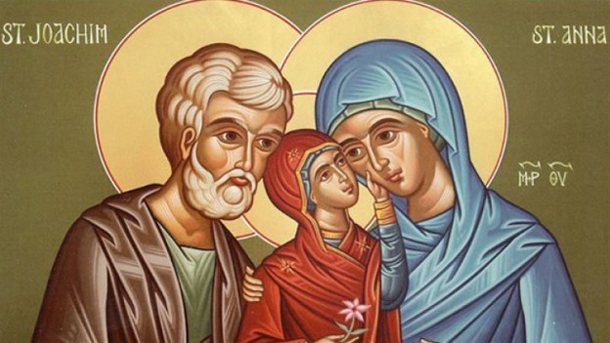 According to the script, Anne and her husband Joachim had no children for a long time. In most ancient cultures this was considered as a bad sign. Their desire and their prayers to God were so sincere that he finally fulfilled their request. One day while Anne was working in the garden, an angel came upon her and told her and her husband that they would have a baby girl. St Anne is considered the protector of pregnant women, children, marriage and family and the feast is mainly celebrated by the women. In Veliko Tarnovo region mothers do not work on this day, so their children stay healthy. In Strandzha region the feast is marked on December 22 and is known there as Sveta Anna or Tuyana.
According to the script, Anne and her husband Joachim had no children for a long time. In most ancient cultures this was considered as a bad sign. Their desire and their prayers to God were so sincere that he finally fulfilled their request. One day while Anne was working in the garden, an angel came upon her and told her and her husband that they would have a baby girl. St Anne is considered the protector of pregnant women, children, marriage and family and the feast is mainly celebrated by the women. In Veliko Tarnovo region mothers do not work on this day, so their children stay healthy. In Strandzha region the feast is marked on December 22 and is known there as Sveta Anna or Tuyana.
In Southwest Bulgaria there is a saying that on this day the sun leaps as high as a chicken over a threshold. This is the time of transition from autumn to winter, but the sun also starts gradually moving towards summer. Lasses predict whether they will marry next year by sowing wheat grains into a new pot filled with water. They also dip apple or sour-cherry twigs into that pot. If the wheat grains germinate by Vasilovden (St Basil Day-January 1) and the twigs put forth leaves this will augur well for the lass and she would marry soon. In Graovo region (Pernik district) the feast is also known as Polazevden. According to people’s beliefs, one can start a new job on this day. In some places people predict how good the following year will be, or the sex of their baby by the first guest who visits the house. Women do not weave and work with wool. Thus, more female lambs will be born in the house and the flocks would be protected from wolf attacks. According to pagan beliefs, men should not go outside the village on this day. Otherwise, they may be charmed by wood-nymphs. In some areas people burn piles of manure, in order to chase evil spirits away. Women hand out boiled wheat and sweetcorn for good health. No meat dishes are allowed on this day, as it is part of the Nativity Fast.
English version: Kostadin Atanasov
Clocks and bells will ring out in the center of Stara Zagora on Saturday, when the city will host the XXIV Masquerade Games Festival . The event will start with a traditional parade of participants. Attractive babugers, araps, old men and other..
Today marks the 88th anniversary of the birth of remarkable Bulgaria folk singer Nadka Karadzhova . Born on March 14, 1937 in the then Pazardzhik village of Trivoditsi (today - Plovdiv region), she is a descendant of an old musical family. At the age..
Every year, the chitalishte (community culture club) in the village of Kralevo not far from Targovishte, re-enacts Bulgarian traditions and rituals, organizing contests such as “Master lyutenitsa - maker” and “From granny’s dresser”. And for the..

+359 2 9336 661
